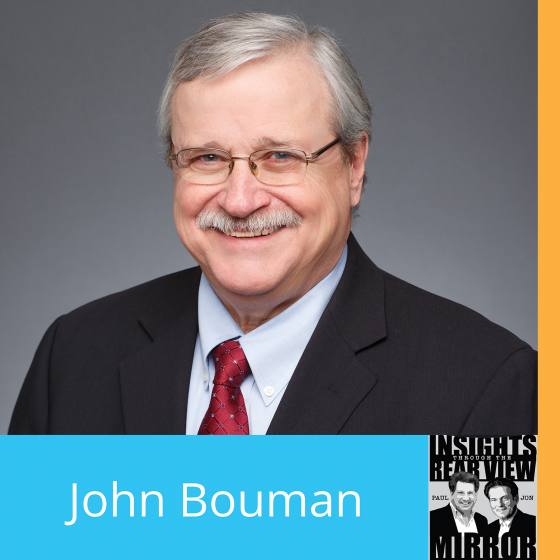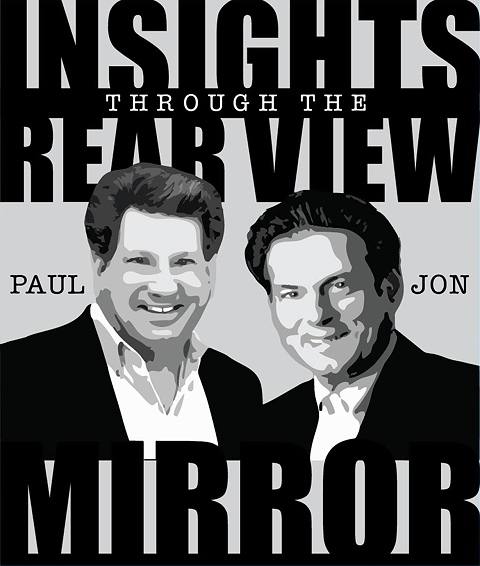Insights Through the Rearview Mirror, December 25, 2020

Insights Through the Rearview Mirror with Jon Kramer and Paul Kramer
Show Title: John Bouman: How Faith, Purpose, and a Clear Vision of Success Lead to Better Decisions
There are few places that require more skill in negotiation and a thicker skin than the political sphere. Today’s guest, a public interest lawyer with over four decades of experience, shares how he makes decisions that affect entire communities—and potentially the entire country—and does so navigating a profession where conflict and adversity among different parties is his day-to-day reality.
We address:
What is the best way to reach consensus among my peers?
How can I get skeptics to embrace my idea?
How do I reach people’s hearts and not just their minds when getting my vision heard?
Jon and Paul welcome public interest lawyer John Bouman, who speaks on the fundamental role of faith in his decision-making framework, the benefits of engaging in vigorous conversations with colleagues, the importance of starting with the end in mind, and why it pays in the long run to pause and take a step back in the aftermath of failure.
3 MAJOR POINTS DISCUSSED
-
Always be working toward a mission. As opposed to working toward a particular dollar goal or any of the other superficial trappings of success, know what drives you internally and let that purpose motivate your decisions.
-
Make better decisions through vigorous conversations with peers. Part of making good decisions is having the right information to add context to whatever it is you’re addressing. A great way to expand that information base, as well as infuse yourself with confidence when finally making the decision, is to engage in dialogue, especially with those who have a stake in the decision. John says it best: “There’s nothing more enjoyable, rewarding, and conducive to good decisions than a vigorous back-and-forth with colleagues who have permission from each other to put ideas out there and also have them batted down to work toward good decisions.”
-
If you’re trying to get your idea heard, always start with the end in mind. If you have an idea or proposal that requires the support of certain parties to bring it to reality, it’s crucial to have a crystal clear picture in your mind of what success looks like. If you know exactly what outcome you’re going for, you’ll be able to work backwards to figure out how to get there. Even if some of these key people are skeptical of your idea, as long as everyone actually knows what you’re trying to achieve, it’s much easier to define the tactics and strategies you’re proposing to hit that goal. You also have a better chance at inspiring confidence in others when you can clearly explain the rationale behind your decision.
OUTLINE OF THIS EPISODE
-
John’s decision-making construct [02:56]
-
The thought-process that led John into advocacy [06:27]
-
Short versus long-term decisions [09:18]
-
Making the right decisions in the tricky world of law reform [13:03]
-
Influencing gatekeepers and adversarial individuals to turn your ideas into reality [20:35]
-
How changes over time in the government’s attitude toward the underprivileged affects John’s approach to policy and negotiation [29:56]
-
Has John ever made a decision that he regrets? [34:25]
-
Engaging the private sector to address poverty [37:04]
-
Avoiding burnout when advocating for major causes such as addressing poverty [39:30]
ABOUT OUR GUEST
John Bouman has worked for 45 years as a public interest lawyer and leader in Illinois and nationally. He recently retired from the Shriver Center on Poverty Law after 24 years as its advocacy director and then President (since 2007). During these years, the Shriver Center has maintained a leading multi-issue law and policy role fighting poverty and racial inequity in Illinois, while also building a national program of training and information for anti-poverty advocates and strong multi-state networks of organizations and practitioners aimed at transmitting state and local strategies and victories across multiple states.
Bouman has deep knowledge of the Illinois and Chicago advocacy landscape and its players. He has led or helped to lead many advocacy coalitions, collaborations, working groups, and ad hoc alliances with likely and unlikely partners. He worked for ten years in high volume storefront practices in Chicago neighborhoods (mostly Uptown and Englewood) and then became a leader with expertise across the wide range of policy issues involved in addressing poverty and the full toolbox of advocacy approaches (organizing, lobbying, litigation, media and more). Among many accomplishments: spearheaded the statewide efforts in Illinois to create both the FamilyCare program, which provides health care insurance for up to 400,000 working poor parents of minor children, and All Kids, the first state plan to extend health coverage to every child regardless of immigration status. He has consulted and co-counseled with advocates in many states; helped draft numerous pieces of legislation; given hundreds of presentations; published extensively; and served as counsel in numerous federal and state cases. He led litigation that forced Illinois to continue paying for health care and related services during the 2015-17 budget impasse. He currently leads the Responsible Budget Coalition, an effort bringing together more than 300 diverse organizations to advocate for state revenue and budget reform in Illinois. He chairs the ballot initiative committee, Vote Yes for Fair Tax, which is organized under Illinois campaign finance law to win an amendment to the Illinois Constitution on the November 2020 ballot that would allow the state to adopt a graduated rate income tax.
Among his honors, he has received the Kutak-Dodds Prize from the National Legal Aid and Defender Association, John Minor Wisdom Public Service and Professionalism Award from the American Bar Association’s Litigation Section, Child Health Advocate Award from the American Academy of Pediatrics, and Excellence in Pro Bono and Public Interest Service Award from the United States District Court and Federal Bar Association. A 1975 graduate of Valparaiso University School of Law and former board member of the Chicago Transit Authority, John currently serves on the boards of Illinois Partners for Human Service, the Center for Law and Social Policy, and the Retirement Research Foundation.
Insights Through the Rearview Mirror
“If I Knew Then What I Know Now – Insights Through the Rearview Mirror”
During the height of the Covid-19 Pandemic, marketing executives, and brothers, Jon and Paul Kramer were discussing the decisions each had made in their lives. The good, bad, big and small and how each of these decisions had informed and transformed their lives.
Out of these heartfelt conversations came the idea of helping others make more considered decision in their lives. And, while there are literally thousands of books on decision making, they started to discuss how to improve on these “how-to” text books to make the art of better decision making easier and more gratifying.
An ongoing theme was “If I knew then what I know now…”
“If I Knew Then What I Know Now – Insights Through the Rearview Mirror” is a journey through the decision-making process of interesting people. The question we will attempt to answer is there a decision-making framework that can lead to a more successful process? A way that will help you make better decisions.
In each episode, we will talk to interesting and intriguing guests about the decisions they have made in their lives, exploring the constructs they may have used and the learning that they have found in their very own “If I Knew Then What I Know Now” journey. Through these discussions, we will illuminate and amplify better ways to approach decisions and help you avoid deciding for the wrong reasons.










